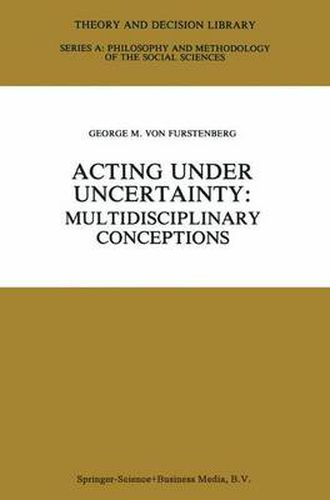Readings Newsletter
Become a Readings Member to make your shopping experience even easier.
Sign in or sign up for free!
You’re not far away from qualifying for FREE standard shipping within Australia
You’ve qualified for FREE standard shipping within Australia
The cart is loading…






This title is printed to order. This book may have been self-published. If so, we cannot guarantee the quality of the content. In the main most books will have gone through the editing process however some may not. We therefore suggest that you be aware of this before ordering this book. If in doubt check either the author or publisher’s details as we are unable to accept any returns unless they are faulty. Please contact us if you have any questions.
Uncertainty could be associated with wisdom, enterprise, and discovery. In ordinary speech, however, it has mostly negative connotations. There is fear of the unknown and ignorance is bliss; there are maxims to the effect that what you don’t know doesn’t hurt you (or: bother you ) in several languages. This volume suggests that we need be bothered by the excessive confidence with which scientists, particularly social scientists, present some of their conclusions and overstate their range of application. Otherwise many of the questions that should be raised about all the major uncertainties attending a particular issue routinely may continue to be thwarted or suppressed. Down playing uncertainty does not lead to more responsible or surer action, it sidetracks research agendas, and leaves the decision makers exposed to nasty surprise. This volume demonstrates that recognizing the many forms of uncertainty that enter into the development of any particular subject matter is a precondition for more responsible choice and deeper knowledge. Our purpose is to contribute to a broader appreciation of uncertainty than regularly accorded in any of the numerous disciplines represented here. The seventeenth-century French philosopher Descartes, quoted in this volume, wrote that whoever is searching after truth must, once in his life, doubt all things; insofar as this is possible.
White areas left on maps of the world in past centuries were a much more productive challenge than marking the end of the known world with the pillars of Hercules.
$9.00 standard shipping within Australia
FREE standard shipping within Australia for orders over $100.00
Express & International shipping calculated at checkout
This title is printed to order. This book may have been self-published. If so, we cannot guarantee the quality of the content. In the main most books will have gone through the editing process however some may not. We therefore suggest that you be aware of this before ordering this book. If in doubt check either the author or publisher’s details as we are unable to accept any returns unless they are faulty. Please contact us if you have any questions.
Uncertainty could be associated with wisdom, enterprise, and discovery. In ordinary speech, however, it has mostly negative connotations. There is fear of the unknown and ignorance is bliss; there are maxims to the effect that what you don’t know doesn’t hurt you (or: bother you ) in several languages. This volume suggests that we need be bothered by the excessive confidence with which scientists, particularly social scientists, present some of their conclusions and overstate their range of application. Otherwise many of the questions that should be raised about all the major uncertainties attending a particular issue routinely may continue to be thwarted or suppressed. Down playing uncertainty does not lead to more responsible or surer action, it sidetracks research agendas, and leaves the decision makers exposed to nasty surprise. This volume demonstrates that recognizing the many forms of uncertainty that enter into the development of any particular subject matter is a precondition for more responsible choice and deeper knowledge. Our purpose is to contribute to a broader appreciation of uncertainty than regularly accorded in any of the numerous disciplines represented here. The seventeenth-century French philosopher Descartes, quoted in this volume, wrote that whoever is searching after truth must, once in his life, doubt all things; insofar as this is possible.
White areas left on maps of the world in past centuries were a much more productive challenge than marking the end of the known world with the pillars of Hercules.